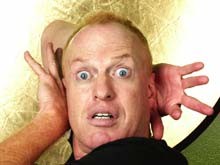Richard Elfman turned a career in crazy old Vegas into a transgressive film masterpiece
| Do you recognize this man? Richard Elfman was a co-founder of the original Oingo Boingo, which brought younger brother Danny to fame, but the elder Elfman is perhaps best remembered for Forbidden Zone, the 1980 film John DeFore calls "cheerfully offensive" and "wildly anachronistic." Recalls Elfman, "There were arson threats at theaters that ran it." |
Cheerfully offensive, wildly anachronistic, and often surreal, the movie makes South Park look like The Cosby Show. The plot is essentially an Orpheus affair, in which a precocious girl stumbles into the Sixth Dimension, an underworld ruled by Hervé Villechaize. Her brother and slow-witted grandpa launch a rescue operation but are met with many distractions: man-sized dancing frogs, nearly naked musical twins - and Satan, who sings and dances a lot like Cab Calloway.
The Prince of Darkness is the director's brother, Danny Elfman, leading an embryonic Oingo Boingo. This is a musical, after all, that appropriates weird pre-war pop in the same way the film's black-and-white visuals borrow the look and feel of a Fleischer Brothers cartoon (albeit one made by pornographers). There's something here to offend everyone, unless you're willing to accept the joke, sit back, and enjoy the strangest trip of your life.
Made in 1980, Forbidden Zone was a tough act to follow. Though he never became a mainstream figure like his brother Danny or daughter-in-law Jenna, Elfman has continued to make films (two in the works are "a Stephen King-ish tale" and a "wacky musical romp `involving` a strange dimension inhabited by Amazon beauties who talk and move in reverse"). He currently lives in "a quaint old house situated somewhere below the Hollywood sign ... the same place where John Lennon resided during his famous year-long 'lost weekend.'" Next weekend, though, devotees of the film and curious readers can meet Elfman in San Antonio when he visits the Alamo Drafthouse to warp young minds.
Can you describe the genesis of Forbidden Zone? It comes from a very strange place.
Shortly after high school, while touring with an Afro-Latin drum ensemble, I moved to Las Vegas where the group was offered a full music and dance review. I ended up staging the show and thus began my directing career. While physically breaking up a fistfight during rehearsal between the English and Spanish speaking contingents, and then getting the show up that evening, my deft touch and firm hand (particularly the left hook) so impressed some Vegas types that they offered me a job directing lavish transvestite musicals in San Francisco - staging raving divas in drag versions of Oklahoma.
`After further adventures in the avant-garde theater world,` we founded the original Mystic Knights of the Oingo Boingo, featuring younger brother Danny Elfman as lead vocalist, composer, and musical director. Our "musical theater" group eventually evolved into "rock" group Oingo Boingo, led by Danny. As the Mystic Knights of the Oingo Boingo was evolving into Oingo Boingo, I wanted to preserve on film what we had been doing onstage. Forbidden Zone is essentially a filmed version of our Mystic Knights stage show. The nice thing about film versus stage is that the film keeps going long after the group is history.
When you say that FZ was a document of the stage show, are you talking about just the Cab Calloway-inspired stuff, or were all the movie's musical numbers representative of what you'd do onstage?
| Forbidden Zone With Q&A by director Richard Elfman 7pm & 10pm Fri, Apr 29 $10 Alamo Drafthouse Westlakes 1255 SW Loop 410 |
What was it like working with Hervé Villechaize? What do you think he thought of the project?
Hervé was great. He came on weekends and painted sets. He kicked his paychecks back into the production. The guy was a hero. Everyone found him charming, even his ex, Susan `who plays the Queen`, who still had vestiges of jealousy over his amorous exploits. Sometimes they would have terrible fights on the set. Susan was a veteran stage actress from New York's Lincoln Repertory Company and had a voice box that could be heard as far away as the moon. Poor little Hervé had a much smaller voice box, so the fights had a tragic-comic air in that, as they screamed at each other, only she could be heard over what seemed like muffled squawking from him.
How was the movie received? Did it get much of a release?
It came out during the height of our "Cultural Revolution of Political Correctness." Now, I don't have a racist, sexist, homophobic cell in my being, but as Senator McCarthy smiled from his grave, his PC doppelgangers ganged up on Forbidden Zone, had it banned from universities, there were arson threats at theaters that ran it, and they generally tried to crucify me. The film quickly came and went. Poof!
Were there really arson threats?
Yes. Cops from the arson squad, the whole nine yards. I was at one of the screenings at the New Beverly Theater in Los Angeles, everyone had to file outside while they checked the theater. Senator McCarthy was indeed smiling from his grave. •
By John DeFore


